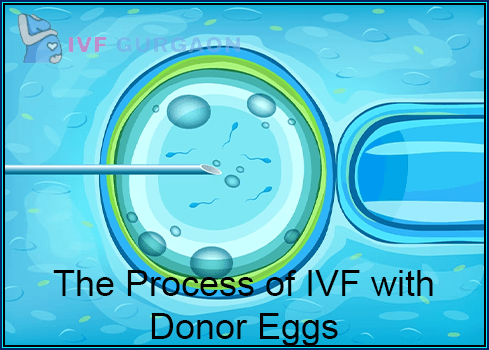
In vitro fertilization (IVF) with donor eggs is a popular assisted reproductive technology that helps women struggling with infertility to conceive. Donor eggs are used when a woman’s ovaries are unable to produce eggs or when her eggs are of poor quality. In this blog, we will explore the process and benefits of IVF with donor eggs.

Choosing a Donor: The first step in IVF with donor eggs is choosing a donor. Donors are typically young, healthy women who have undergone rigorous medical and genetic screening. Some couples choose anonymous donors from a donor egg bank, while others prefer a known donor, such as a family member or friend.
Synchronization of Cycles: The menstrual cycle of the donor and the recipient are synchronized through medication. The recipient takes medication to prepare her uterus for embryo transfer, while the donor takes medication to stimulate the ovaries to produce eggs.
Egg Retrieval: Once the donor’s eggs are mature, they are retrieved using a minimally invasive procedure called transvaginal ultrasound-guided egg retrieval. The eggs are then fertilized with the partner’s or donor sperm in the laboratory.
Embryo Transfer: After fertilization, the embryos are cultured for several days before being transferred into the recipient’s uterus. The number of embryos transferred depends on the recipient’s age and health, as well as the quality of the embryos.
High Success Rates: IVF with donor eggs has a high success rate, especially for women over the age of 40 or those with poor egg quality. This is because the eggs used in the process are young and healthy.
Reduced Risk of Genetic Disorders: Donor eggs undergo rigorous screening to ensure they are free of genetic disorders, reducing the risk of passing on genetic disorders to the child.
More Control over the Pregnancy: With IVF using donor eggs, the recipient has more control over the pregnancy. She can choose the donor, and in some cases, the sex of the child.
Improved Emotional Wellbeing: IVF with donor eggs can also improve the emotional wellbeing of couples struggling with infertility. The process provides a new sense of hope and the opportunity to conceive a child.
IVF with donor eggs is a viable option for women struggling with infertility due to poor egg quality or the inability to produce eggs. The process involves choosing a donor, synchronizing cycles, egg retrieval, and embryo transfer. The benefits of IVF with donor eggs include high success rates, reduced risk of genetic disorders, more control over the pregnancy, and improved emotional wellbeing. If you are considering IVF with donor eggs, speak to a fertility specialist to determine if it is the right option for you.